Board Games Reviews: #1 Isle of Skye
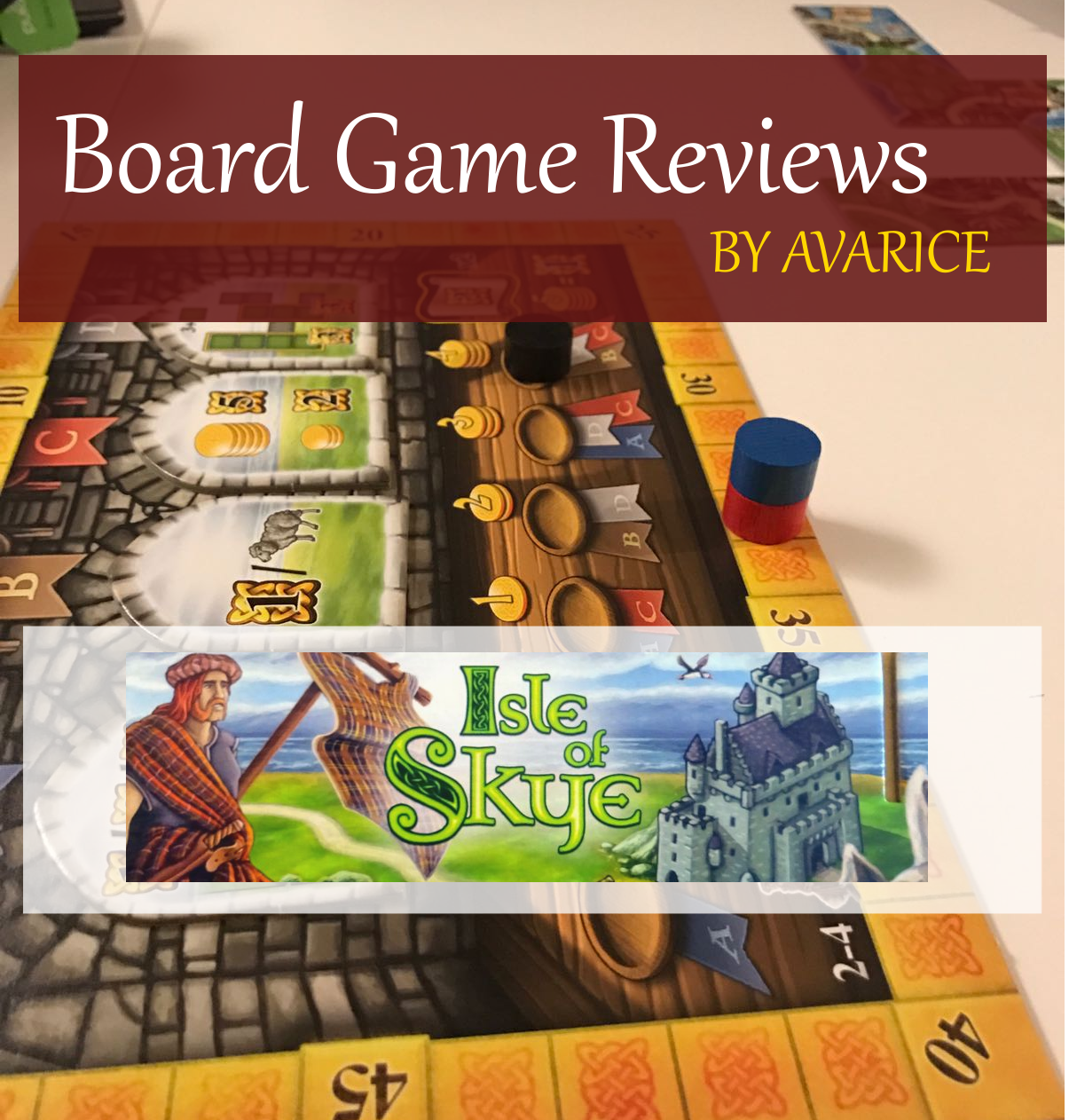
Background to the game
The board game The Isle of Skye from Chieftan to King is an economic, Euro-style, tile-laying game first published in 2015. It went on to be crowned the winner of the highly regarded Connoisseur-gamer Game of the Year 2016, the 2016 UK Games Expo Best Boardgame and was nominated for several other awards in 2015.
The game was designed by Alexander Pfister and Andreas Pelikan. This is not their first time designing a game together, and between them, they have a long list of successful board games.
Isle of Skye takes its name from a small Scotish island and this influence can be further seen in the design on the front of the box and the pieces that make up the game - more on that later.
The game can be played by between 2-5 players and usually lasts around 60 minutes*.
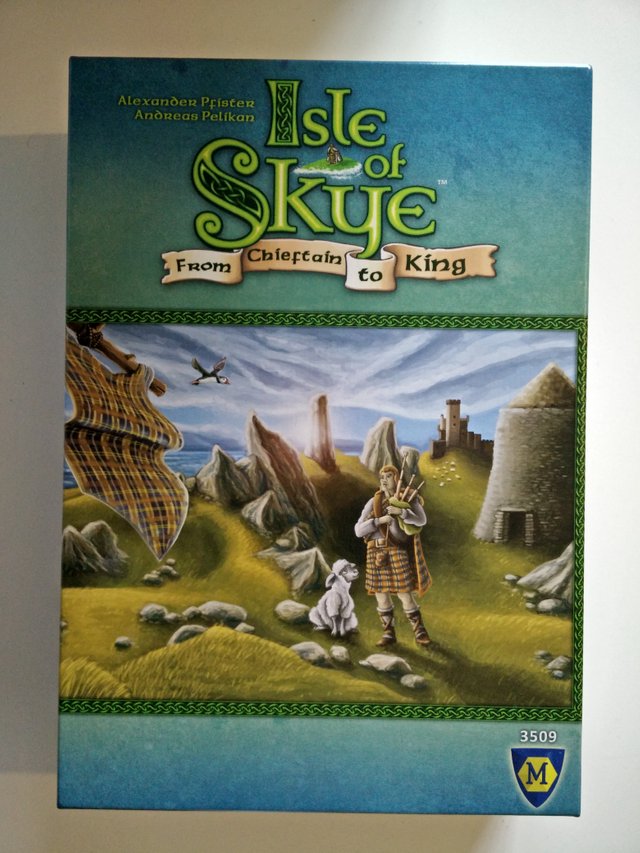
About the game
Each player takes on the role of a Scotish Chieftan looking to expand their kingdom, material wealth and coffers throughout the duration of the game by placing tiles; expanding out bit by bit from their starting castle like so:

On the face of it, the tiles look similar to that of Carcassonne and you could be forgiven for jumping to the conclusion that the game offers nothing above and beyond an aesthetic tweak to a much loved, classic, game; most of the mechanics of actually placing the tiles are similar - you can only place tiles in valid positions e.g. grass edges to grass edges, water edges to water edges with the exception that unlike Carcassonne it's not a problem if you terminate a road - but that is where the similarities end.

You can see a comparison, above, of Isle of Skye's tiles on the left and Carcassonne's on the right
However, Isle of Skye has a number of different game mechanics that not only serve to differentiate it from Carcassonne, but serve to add to the balance and replayability of the game too. Below is a quick overview of some of the different game mechanics:
Game mechanics
Bidding for tiles
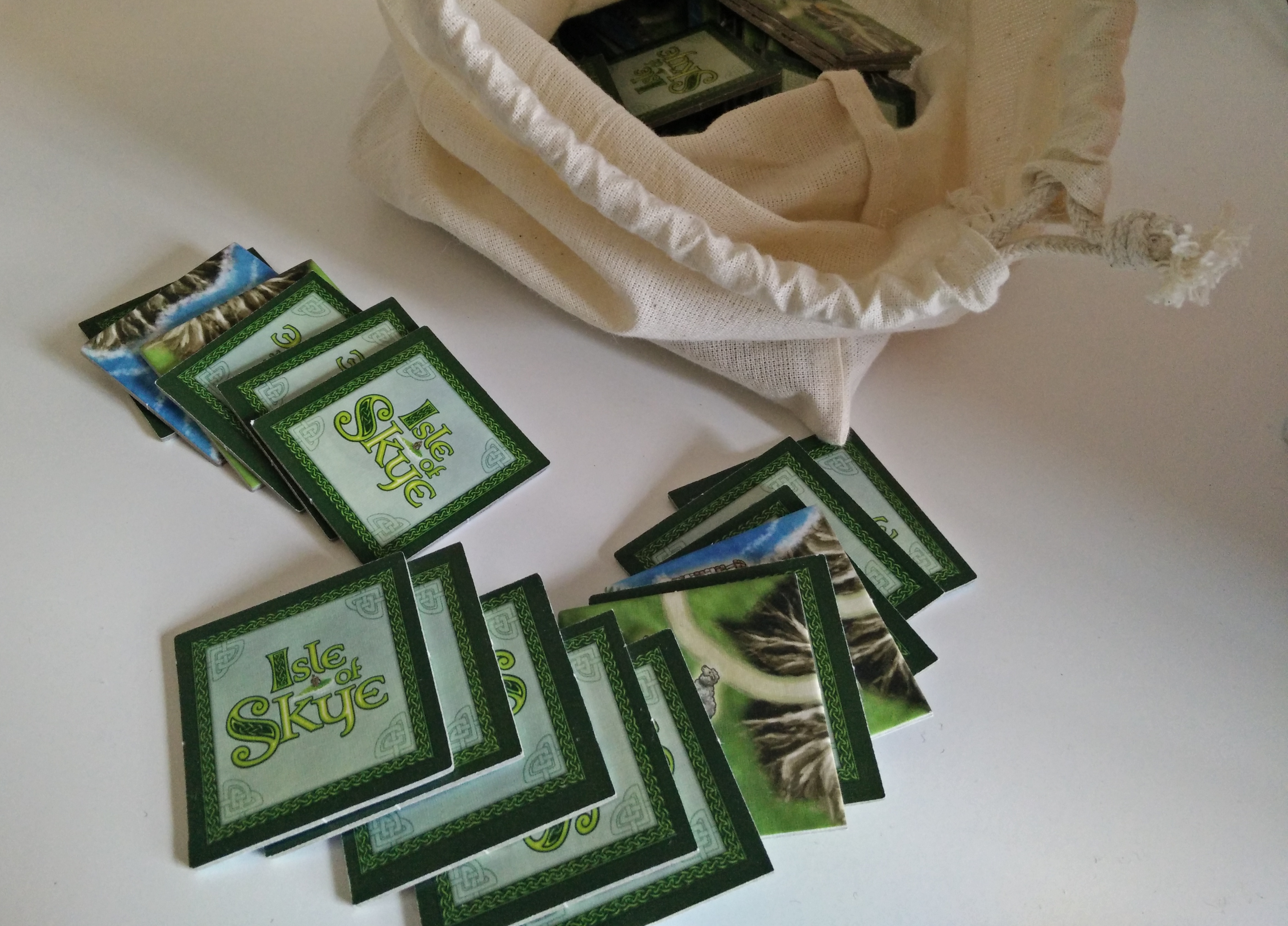
Randomly picking tiles from the cotton bag provided
At the beginning of each round, each player blindly picks 3 tiles out of the provided cotton bag and puts them face up in front of the screen showing their clan's name. The players keep their money tokens and their axe token behind the screen - this is integral to the game because it keeps your opponents from knowing how much money you have and what strategy you are going for.
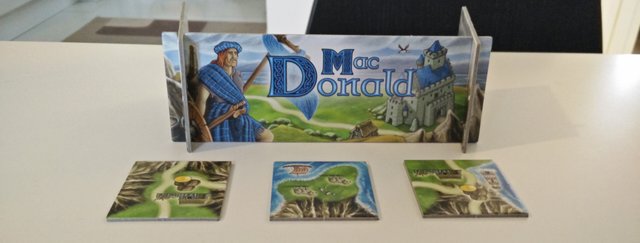
The view your opponent has of your screen and tiles.
You can only keep two of the three tiles that you have picked out of the bag, so the axe is used to indicate which tile you are going to discard - the money is then used to put up a stake against the two tiles you want to keep. You have to weigh up the value of your tiles and how much you are willing to pay to secure them against how much you might want to buy an opponent's tile - and how much they may have valued that tile at.
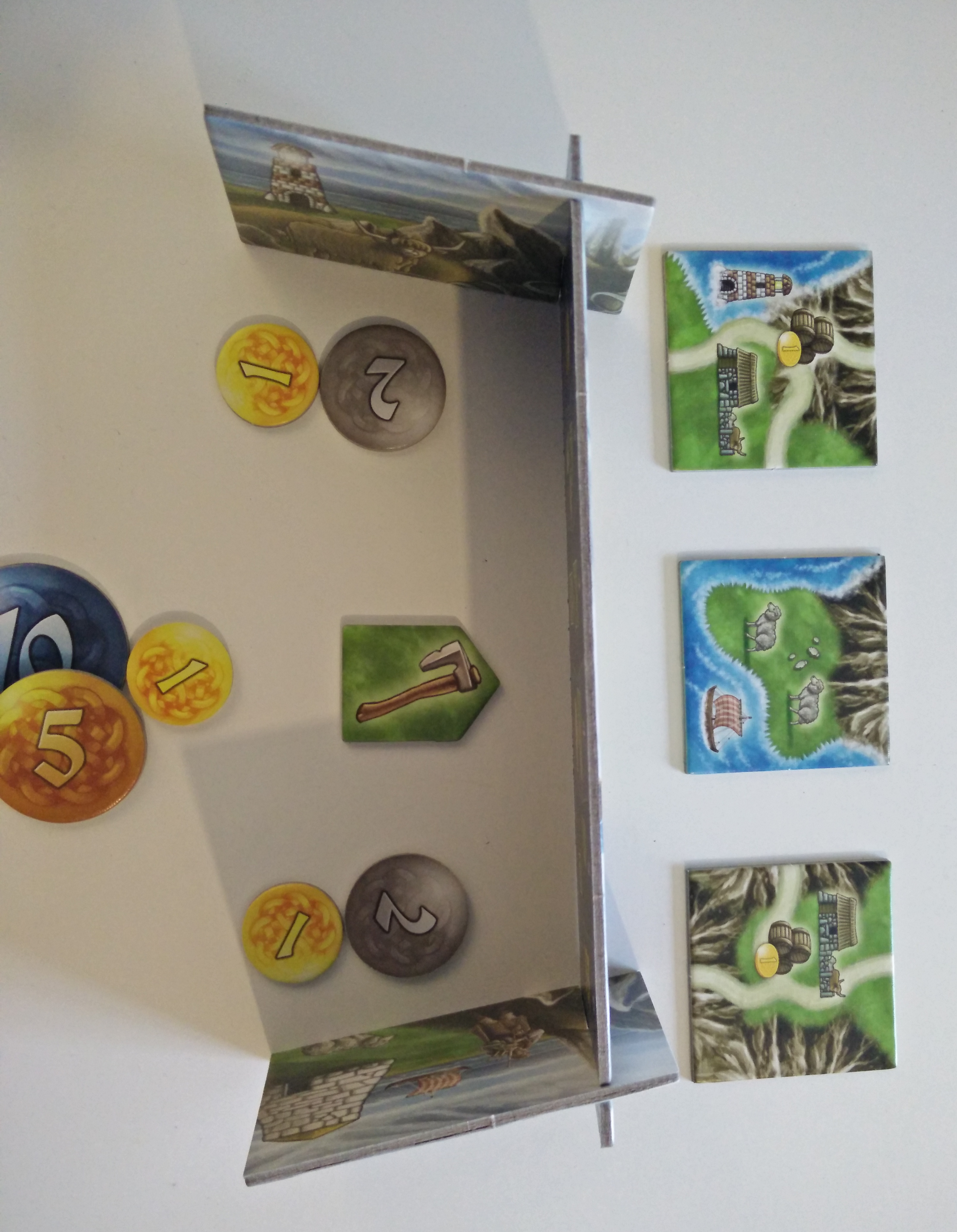
Selecting which tile to destroy and putting a value to the other two tiles
Once everyone has allocated money to their two tiles and picked a tile to discard, everyone reveals their play. One-by-one the players take it in turn to buy an opponent's tile - and this is where you find out whether your gambles paid off or not; and how this affects your turn. Some turns you are left feeling exhilarated and you return back to your kingdom feeling like a champion with all of the spoils of war, and some turns it doesn't go at all as planned and you slink back to your kingdom with your solitary tile licking your wounds.
Some turns you are left feeling exhilarated and you return back to your kingdom feeling like a champion with all of the spoils of war, and some turns it doesn't go at all as planned and you slink back to your kingdom with your solitary tile licking your wounds.
Scoring
A brilliant aspect of Isle of Skye that not only makes the game balanced (and fun for each of the players throughout the duration of the game), but also adds to the replayability of the game is the scoring mechanism.
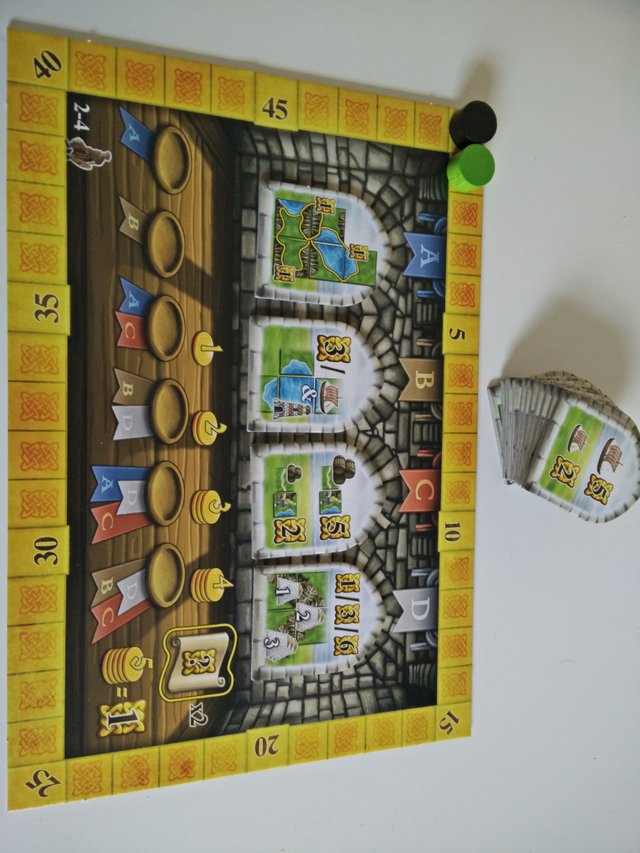
The scoring board with goals and scoring track
At the start of the game, four goal tiles are randomly selected from a large stack of goal tiles and placed on the scoring board for each of the players to see. As the game progresses through the different phases one or more of the goals are active and will be scored at the end of the round. This creates the strategic element to the game; and since only a small number of the tiles are used each game and their order is random it means that each game feels unique. You don't get bored of playing it with different groups of friends (or the same friends); the game has a great replayability factor.
There is also a simple, yet elegantly powerful mechanic for balancing the game built into the scoring mechanism (which is reminiscent of an element of Power Grid); once a couple of rounds have gone by everyone except for the player with the most points gets bonus money tokens relative to the number of players with a larger score than them. This means that the players falling behind have more money in subsequent rounds to put up as bonds against the tiles they want to keep or to be able to use to buy tiles that their opponents have that they fancy. This really helps to level the playing field and keep all of the players enjoying the game round after round.
Building up your kingdom
Each player (Chieftan) builds up their kingdom of tiles in isolation - which differs from Carcassonne and I think that this design decision helps to keep the gameplay fun, less confrontational and removes the need for Meeple management. It's still important to keep an eye on the kingdoms that your opponents are creating, so that you can make strategic decisions about the tiles that are in play each round, but you don't end up in the frustrating position of an opponent creating a situation where you can no longer place a tile where you wanted to because it would be an illegal move.
When placing your tiles, to build your glorious kingdom, there are the basic mechanics to valid tile placement to consider, but most importantly the real significant things to consider if you want to score a lot of points, crush your foes and be crowned king (and to be honest, who doesn't enjoy being crowned the victor!) when placing your tiles is whether you can close off areas of grass, water or mountain and how you can work towards the overarching goals used for scoring this round and in future rounds.
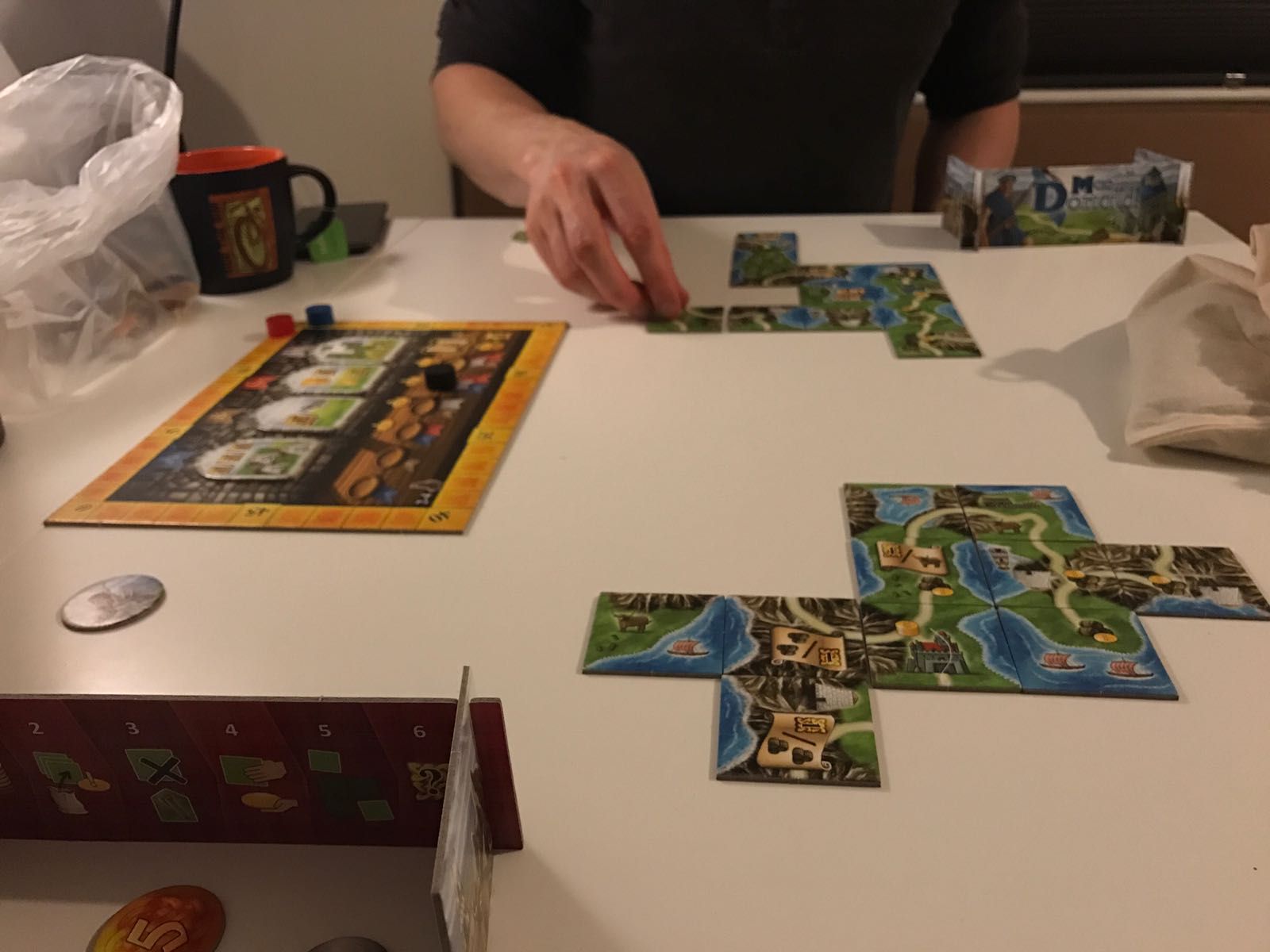
Conclusion
I fell in love with this game the first time that I played it; it has clearly been inspired a number of other successful board games, taking aspects of them to create something simple to learn and play, compelling and unique.
The game works really well with two players - when I last played, there were a couple of rounds where we were tied for points and it was only on the very last phase of scoring that I hopped ahead on the scoring ladder to take the victory. It was nail biting stuff!
Creating a board game that doesn't require a huge manual to learn how to play it, contains strategical depth and doesn't rely over heavily on luck is quite an achievement; I can definitely see why Isle of Skye was awarded the Connoisseur-gamer Game of the Year award and I would be so bold as to say that I think that its ranking of 142 on BoardgameGeek doesn't do it justice.
I would definitely recommend to even the most seasoned board game enthusiast to give this game a go. It's part of my board games collection and I think that it should be part of yours too!

Thank you for posting @avarice.
Lovely board game......appreciate you giving Steemians a well written...comprehensive review and introduction to what looks like a great game.
Cheers.
Thanks for your kind words and support @bleujay - I'm glad that enjoyed it 😊
Thanks for this very clear and well organized review. I was interested in Isle of Skye because I found out about Alexander Pfister through Great Western Trail. I thought that this game might be too light for me, but you've got me interested now.